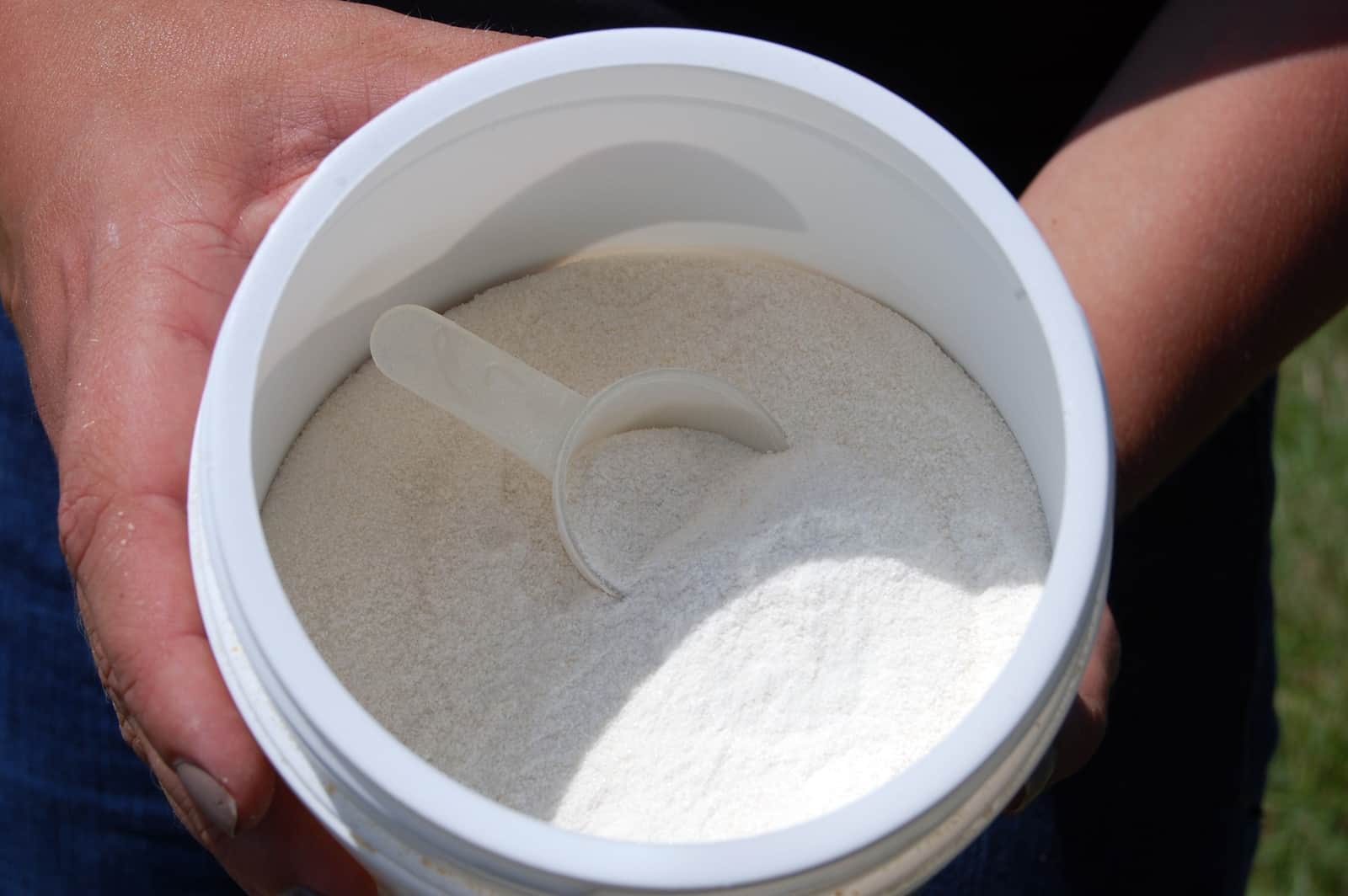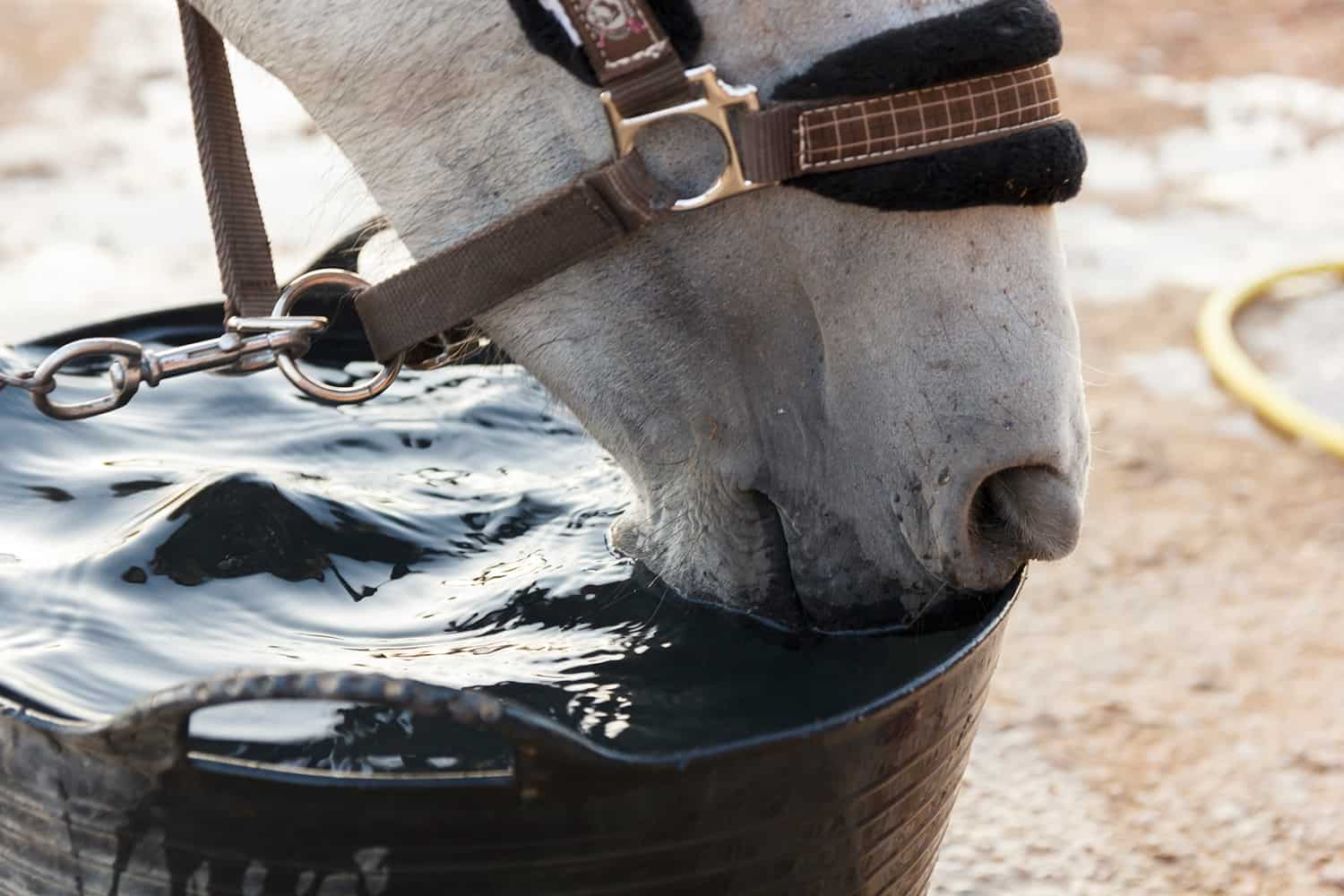Practical Electrolyte Use in Horses

These minerals are key to hydration and cellular function
With the variety of human sports drinks on the market, almost everyone these days is familiar with electrolytes. But what are they, and what role do they play in equine health?
Electrolytes are components of salts (or mineral salts) that carry an electric charge (as ions) when dissolved in fluids. “About 2⁄3 of the horse’s body weight is fluid,” says Harold Schott, DVM, PhD, Dipl. ACVIM, professor at Michigan State University’s College of Veterinary Medicine, in East Lansing. “Water is the most abundant molecule in the body, whether horse or human; however, it’s not plain water—it’s a solution of water and electrolytes. Electrolytes make up a critical component of the horse’s total body fluid.”
These minerals include sodium, potassium, chloride, calcium, magnesium, and bicarbonate, says Michael Peralez, DVM, Tevis Cup head veterinarian and four-time finisher who runs a private practice in Arcadia, California. “They are involved in fluid balance, hydration, and nerve conduction,” he adds.
Electrolytes play a crucial role in cellular signaling. “It’s actually a shift of electrolytes across a nerve or muscle cell membrane that makes the nerve fire or the muscle contract,” says Schott. “Sodium and potassium are the two main electrolytes involved in that process and are essential for body organ daily functions.

“Some electrolytes are quite plentiful, and some are not,” he continues. “The one probably most people are interested in is sodium. When we talk about basic table salt, that’s sodium, coupled with a negative ion called chloride: sodium chloride. Interestingly, all mammals evolved on diets … very marginal in sodium chloride but excessive in potassium chloride. As a consequence of a relatively salt-poor diet but a relatively potassium-rich diet, our kidneys are very good at conserving the sodium that is filtered from the blood and urine, while actively dumping excessive amounts of potassium.”
For most horses, a normal diet supplemented with a salt block provides all the necessary electrolytes. “Electrolyte loss for horses at home can be made up through hay and a salt lick,” says Peralez, including pure salt licks (white), salt and mineral licks (red), Himalayan salt, and table salt sprinkled over feed or in water. “Most horses can ‘self-medicate’ with a salt lick and take care of their electrolyte deficiencies.”
When to Supplement
In certain conditions a horse’s electrolyte needs fall beyond the scope of his daily diet. “Horses that work hard, especially in heat, sweat a lot and lose a lot of electrolytes in the sweat,” says Peralez. “Endurance horses, for example, can lose 10 to 15 liters of fluid per hour when it’s hot, losing a lot of electrolytes in sweat. Those need to be replaced.”

Therefore, equine athletes such as these, along with event horses and racehorses working under extreme conditions, might be candidates for electrolyte supplements. These are available as powders or pastes. But not all electrolyte supplements are created equal, says Schott.
“The formulations of electrolytes are quite variable,” he says. “The two most important ingredients you’d like to have are sodium chloride and potassium chloride. Some products have glucose, or sugar, as the most common component. The horse doesn’t really need glucose.
“Human marathon runners eat energy gels during a race, which are more sugar than electrolytes,” he adds. “This helps people that do endurance exercise maintain their muscles’ sugar content. We don’t think horses need that, but some of the formulations you can buy for horses in the feed store are misformulated and contain predominantly sugar.
“If we would estimate the amount of electrolytes lost in sweat in an endurance horse doing a 50-mile race, for one of the products that’s mostly sugar, it would take 600 tubes of electrolyte paste to replace the amount of sodium lost in sweat,” he continues. “If you look at the label, the (ingredient included in the highest amount) is listed first, so you want to look for (a product with) sodium chloride and potassium chloride as the top two ingredients. If it starts with dextrose or glucose, that’s not a formulation you would want.”
A simple solution, he says, is to administer 1-2 heaping tablespoons of sodium chloride in the horse’s grain twice a day. “Table salt is the least expensive formulation and the only one we really know about scientifically,” Schott says, adding that it doesn’t matter if it is iodized or not—there is not enough iodine to cause toxicity for a horse. “A lot of people get worried about (providing enough) calcium and magnesium, but there is plenty of calcium and magnesium in hay.”

Performance Effects
Over the years Schott and his research team have been examining endurance horses’ electrolyte needs. “A big difference between horses and human athletes is that the horse has about 10% to 12% of its body weight in food that it has eaten in its intestinal tract,” he says. “That content is 80% to 90% water. In that water is a large reserve of electrolytes. Endurance horses often don’t drink for the first half of the ride, because they are absorbing water and electrolytes from the intestinal content. Humans only have about 1% to 1.5% of the body weight as consumed food.”
Schott explains that in years of endurance horse research, equine nutritionists and veterinarians have gone from aiming to replace all the electrolytes they expect a horse to lose in its sweat in a day, believing that was necessary, to only replacing 25%-40% of the estimated losses. This is because they recognize that the horse recovers the other losses by absorbing them from the intestinal tract and replacing that reservoir over the next one to three days via meals and exercise recovery. “We recommend less electrolytes than we used to for endurance horses,” he says.
In a 2004 study of Arabian horses running a simulated endurance race on a treadmill, Schott and his team observed that horses on an electrolyte supplement formulated to replace expected losses in the sweat drank more water voluntarily, during and after exercise, than horses that did not receive an electrolyte supplement.
“We tricked the horses into drinking more water and maintaining their hydration better,” he says, “but there was no difference in their heart rates, their core body temperatures, or their ability to complete the exercise bouts.
“We followed the horses for three days and they did recover more quickly,” he adds. “In theory, this should make them better prepared for a subsequent work episode, but this wasn’t specifically studied.”
In another study, done at two 50-mile endurance rides, his team again found that electrolyte slurries encouraged horses to drink more but offered no performance benefit. So, from these studies, “We have no evidence to say electrolytes improve performance; they do help replace water and electrolyte losses that are sustained by sweating during exercise,” Schott says.
He cautions there can be too much of a good thing: “We used to think it wasn’t possible to oversupplement electrolytes because horses would just urinate the extra out. However, when we did our field study looking at horses in a 50-mile competition, we actually got their blood sodium and their blood chloride levels high, above what we would consider normal, so I do think it’s possible to oversupplement; that’s why our recommendation would be (replacing) no more than about 25% to 40% of the expected losses,” keeping in mind that horses produce 5-10 liters/hour or more on hot, humid days.

Practical Considerations
Horses working at high levels and in extreme humidity and heat are candidates for supplementation to replenish their electrolyte losses, says Schott. When choosing a product, read labels carefully.
“For example, the 600 tubes of (the sugar-laden) electrolytes mentioned earlier would cost more than $1,000. You could get the same amount of sodium chloride buying table salt at your local supermarket. A couple of heaping tablespoons of table salt is a whole lot more cost-effective.”
Owners might consider administering electrolytes to any horse that is being shipped or is ill, says Schott.
“When traveling, you may want to stimulate the horse to drink more to minimize the risk of colic; the horse isn’t really losing electrolytes,” he says. “However, some horses will drink more, others won’t.
“For sick horses I’ll give an oral electrolyte slurry, but if the horse doesn’t drink after a couple of doses, I’ll stop,” Schott adds.
Peralez recommends acclimating your horse to an electrolyte preparation before administering it to the horse on the road. “If you are thinking of using a supplement at a competition, practice at home beforehand,” he says.
Anytime you offer electrolytes in water, Peralez recommends offering plain water, as well. Provide a choice of two water buckets, adding electrolytes to only one.
Owners can also acclimate their horses to drinking salt water, says Schott, which he believes is underutilized. “Because the stimulus for drinking is an increase in sodium in the blood, by drinking salt water, sodium levels don’t go down as they would after drinking plain water, so horses will drink more plain water when we offer it half an hour later,” he says.
Schott says study results have shown horses have a preference for cool water, as it would come out of a hose, over ice-cold water, with an isotonic salt concentration (the same concentration of electrolytes as in the blood, which would be about 2 heaping tablespoons of table salt per gallon of water).
Dr. Michael Peralez
“Supplemental salt intake (as oral slurries or salt water) will increase water intake, attenuate BM (body mass) loss, and will likely improve recovery,” says Schott.
But again, not every situation calls for supplementation: “Horses competing for two hours or less (or eventers competing in cool, less-humid conditions, or racehorses running without the drug furosemide) do not need electrolyte supplementation during exercise,” he says, adding that, “horses competing for more than two hours should be provided access to rehydration fluid at least once an hour. Again, initially providing salt water at ambient temperature could enhance total fluid intake during and after completion of exercise.”
As always, best practices take priority. “In years past people didn’t use a whole lot of electrolytes,” says Peralez. “The question is, does it really make a difference in competition? The horses did well before electrolyte supplementation, but I think we are doing a better job for the horses when we do supplement. Each horse is different, and we’ve come to realize over the last couple of decades that some horses do require electrolytes in the form of table salt or commercially available electrolyte supplements.”
Written by:
Natalie DeFee Mendik, MA
Related Articles
Stay on top of the most recent Horse Health news with












